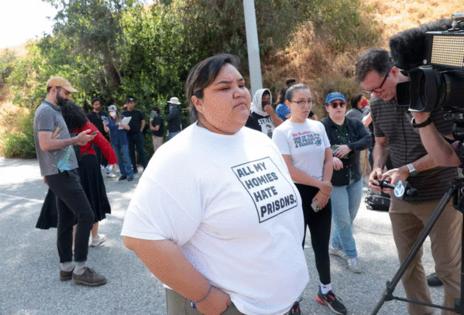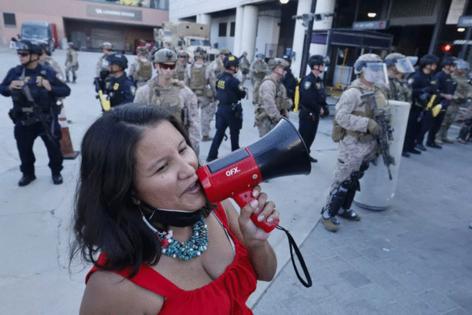LA volunteers who document ICE raids are being arrested. How to do it safely
Published in News & Features
LOS ANGELES — Amanda Trebach, a Los Angeles resident who volunteers to document immigration enforcement operations on Terminal Island in San Pedro, found herself early Friday morning on the wrong side of an enforcement action.
She was pinned to the ground, handcuffed and put into an unmarked black van by masked federal agents.
The arrest put a spotlight on the risks faced by a growing number of volunteers who work to document immigration enforcement actions across Southern California.
Trebach is a member of Unión del Barrio, an immigrant rights organization, one of several advocacy groups that conduct local patrols to respond to and document immigration enforcement operations in Southern California.
For the last several months, the registered nurse, alongside members of the Harbor Area Peace Patrol, has volunteered her free time to help document masked federal immigration officials coming into and out of Terminal Island, which is being used as a staging area for immigration enforcement operations.
The Department of Homeland Security blamed Trebach for inciting her own arrest, saying in a statement that she "jumped in front of moving vehicles, causing [Border Patrol agents] to swerve out of the way."
Trebach allegedly "continued to hit the car with her signs and fists while yelling obscenities at agents. After vehicles evaded her, she again physically blocked and impeded CBP from completing their duties."
Federal agents arrested her on suspicion of impeding and obstructing federal law enforcement. However, Trebach was released from the federal detention center in Los Angeles on Saturday night without criminal charges, according to National Nurses United, a union and professional association of registered nurses.
Immigrant advocates alleged Trebach was targeted for her political activism. On the morning of her arrest, Trebach's supporters say, federal agents swerved their vehicle toward the group of advocates and Trebach dropped her sign, which possibly hit the vehicle.
Despite the risks, immigrant advocacy groups say they have seen a growing interest among community members to get on the front lines to document immigration arrests.
The Community Self Defense Coalition, an immigrant advocacy organization made up of about 80 subgroups across Los Angeles County, has been getting calls from concerned residents asking for resources for their neighbors and wanting guidance on how to create their own supportive network, including local patrols.
Advocates say the best way to get involved is to volunteer with a local group that can train and prepare you for patrols and documenting enforcement operations.
"We must do so, however, in a way that keeps us safe, that doesn't jeopardize our security and our constitutional rights because the times in which we're living are just a bit too aggressive," said Jorge-Mario Cabrera, director of communications for the Coalition for Humane Immigrant Rights.
What are your rights when documenting immigration enforcement actions?
You have the 1st Amendment right to observe, take photographs and record video of immigration enforcement in public places, which includes streets and sidewalks, according to the Immigrant Legal Resource Center, and Witness, a nonprofit that advocates for the documentation of human rights violations.
"Do so in a way that you know ensures both your safety and ensures that you also are not getting involved in the [enforcement] actions whereby you can be charged with interference," Cabrera said.
Immigration enforcement officials can arrest you for interfering or obstructing an operation if they believe you are getting between a federal officer and the person they're arresting.
In this environment, whether you've been alerted to an arrest taking place or have stumbled into one as a bystander, advocates say an operation can happen quickly and the situation can escalate.
If you decide to document, you should consider "how ICE prioritizes their own safety and their potential aggressive response to your presence," according to Witness.
You also should consider how to document someone who is being detained.
Advocates have mixed feelings about recording or taking photos that identify a person being arrested.
Some recommend that you try to avoid exposing the arrested person's identity, instead focusing on recording law enforcement officials.
However, other organizations, such as Instituto de Educacion Popular del Sur de California (IDEPSCA), will temporarily post a screenshot of those who have been arrested on its Instagram account to help identify the arrested person and notify their family.
How can you safely document an arrest?
If you encounter an arrest or enforcement operation, Manuel Vicente, director of radio station and immigrant rights group Radio Jornalera, suggests the following safety tips before you hit the record button or snap a photo:
•Remain calm.
•Keep a safe distance from immigration enforcement officers and the person who is being arrested.
•Do not interfere with immigration enforcement operations.
•Narrate factual context such as location, date, time, number of immigration officials, badge numbers, whether the officers are on foot or in vehicles, whether the officers are carrying any weapons.
•If an immigration official tells you to back away, comply and record yourself doing so (for example, point the camera toward your feet to show you are moving backward).
•Don't post the video to social media. Instead, share it with a local advocacy group or rapid response network so they can verify the documented information.
Either during or after the incident, call your local rapid response network to notify and share any documentation with them.
Here is a list of local rapid response contacts compiled by the ACLU of Southern California and California Collaborative for Immigrant Justice.
•Coalition for Humane Immigrant Rights, (888) 624-4752
•Boyle Heights Immigrant Rights Network, (323) 805-1049
•Promesa Boyle Heights, (323) 922-5644
•ORALE (Long Beach), (562) 276-0267
•Long Beach Community Defense Network, (562) 245-9575
•Inland Coalition for Immigrant Justice, (909) 361-4588
•Southern California Bilingual Rapid Response Legal Resource Hotline, (213) 833-8283
•U.S. Africa Institute, (310) 951-7721
Where can you volunteer or get training to document arrests?
There are several organizations that offer training sessions and volunteer opportunities, including:
Adopt a Day Labor Corner — The National Day Laborer Organizing Network is building a network of volunteers who regularly show up to a location where day laborers gather. These volunteers will provide people with "Know Your Rights" information, document any immigration enforcement activity and ultimately build relationships with their community members. You can register a "corner" and submit it to the organization online.
Community Self Defense Coalition LA — The coalition is made up of more than 80 organizations throughout Los Angeles County with upward of 1,000 members. Subgroups of the coalition conduct patrols for immigration enforcement activities and provide "Know Your Rights" education sessions. You can sign up to be a volunteer online.
Unión del Barrio —Unión del Barrio conducts in-person and virtual training sessions that are geared toward specific neighborhoods, communities and topics. Some topics include community patrol training, how educators can protect students from immigration enforcement operations and "Know Your Rights" education sessions. For more information on training sessions, follow Unión del Barrio on Instagram or Facebook, or email the group at comitecentral@uniondelbarrio.org.
IDEPSCA —The nonprofit is accepting volunteers to assist in community patrols, observing and documenting immigration enforcement operations and verifying enforcement operations. To become a volunteer, send a direct message to the nonprofit's Instagram.
CHIRLA —CHIRLA's rapid response network supports community members after an immigration raid or arrest. Volunteers help connect affected families with supportive services that include food and legal referrals. To become a trained member of the rapid response network, fill out the group's online form and email questions to Ingrid Olvera at ivolvera@chirla.org.
Órale —Órale, an immigrant rights advocacy group focused on Long Beach, is looking for volunteers to join its rapid response network to respond to immigration enforcement activities. Interested volunteers should fill out the organization's online form.
©2025 Los Angeles Times. Visit at latimes.com. Distributed by Tribune Content Agency, LLC.










Comments